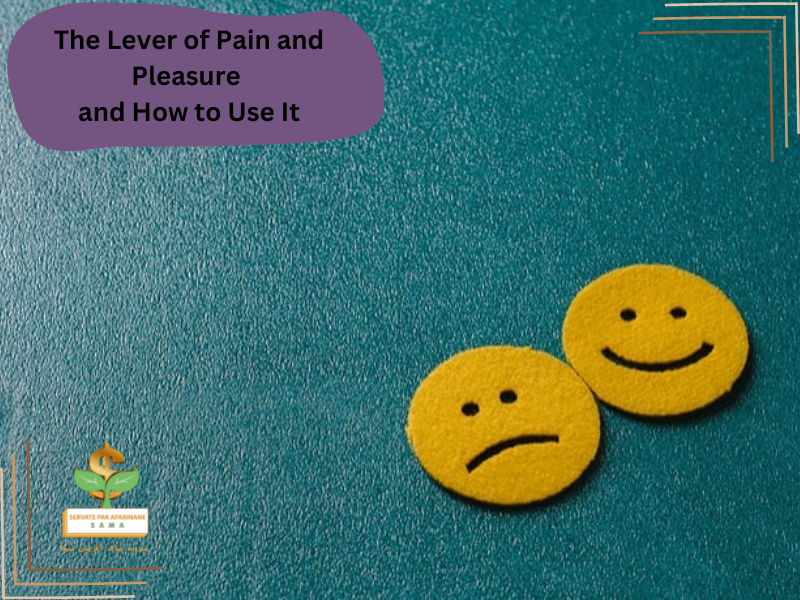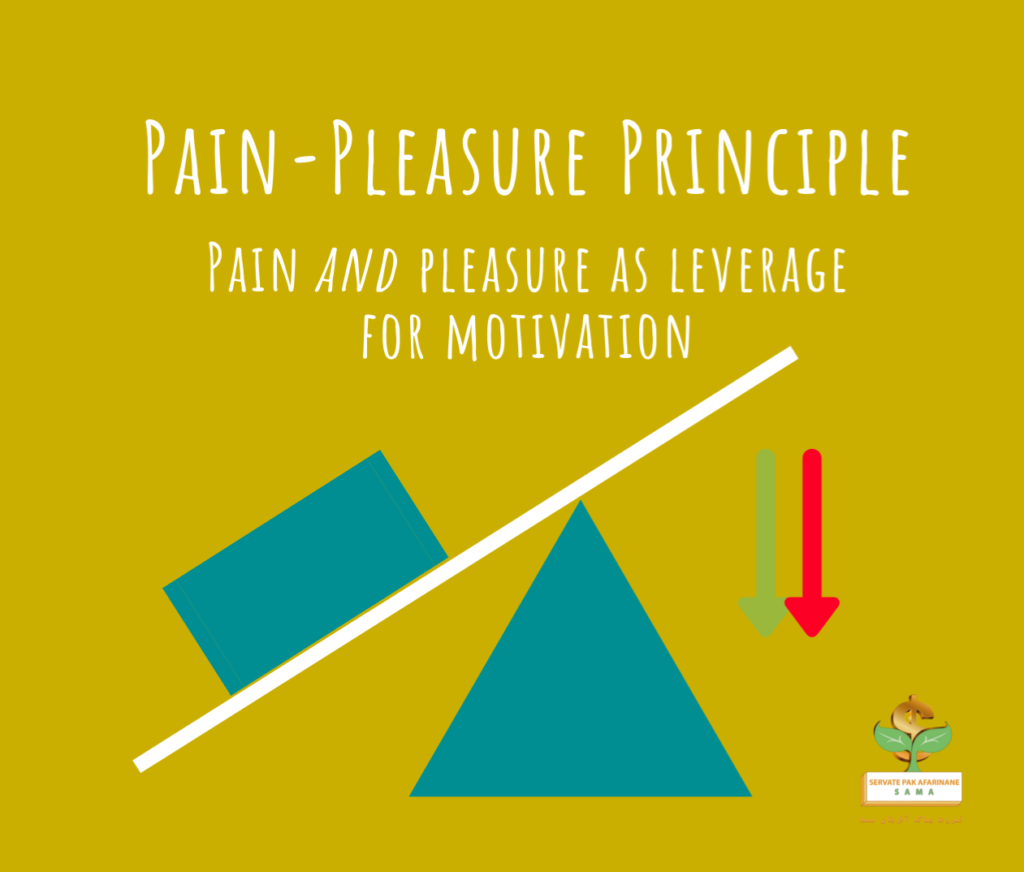
The Lever of Pain and Pleasure
In this article, we are going to examine the effect of the lever of pain and pleasure, now the question is, have you ever heard the expression of the lever of pain and pleasure? In this article, there are some points that I can confidently say that learning and practicing these teachings will change your life forever. So please read this article carefully and review it several times and follow all the exercises. If you have read many articles and books on personal development, but you still ask yourself:
- So why didn’t I follow the rules of the book? I knew I needed what he wrote, but why didn’t I start?
- I know I need to learn that skill for my progress, but why do I keep putting off learning?
- I know I should start that business to increase my income, but why don’t I start?
- What is stopping me from moving?
If such questions have occupied your mind, I recommend you read the article on the lever of pain and pleasure and how to use it carefully. Because it is specific to you and will answer your questions. Topics that we will see in this article:
- The law of escape from suffering and longing for happiness
- Everything is under the head of neural pathways in your brain!
- Create new neural pathways!
- Practice the lever of pain and pleasure
The law of escape from suffering and longing for happiness
Human behavior is controlled by two forces, the escape from discomfort and the desire to achieve happiness. These two forces control your life. Sometimes they push you forward, and sometimes they stop you. Always remember that everything you do in life is to avoid unhappiness or gain happiness.
A Basic Question
Have you ever felt numb? Do you know what I mean by numbness?
Numbness means doing nothing. It means that we know we have to do something, but we don’t start it or continue it. Many times when we start doing something, we use this term: It doesn’t feel like it today! This feeling creeps in, grows, and eventually takes over your life.
Let’s see why we stop like this and why we become numb. The answer to this question can be given according to the same law of escape from suffering and passion. If you don’t do something, it’s because you think it’s more unpleasant to start than not to do it. In other words, we believe less pain and suffering will come to us by sitting idly. You might say: No, I know that if I do this, I will get a lot of pleasure from the success of it.
Yes, Sure. But it is registered in your subconscious: in order to do something, you have to suffer a lot of discomforts, and now this discomfort is much more tangible for you, while the joy of success may be far away. Isn’t that so? In private, check out my words and see if you feel the same way.
Now let’s take an example
Maybe you, like many people, have decided to go on a diet and get rid of your excess weight forever. But to what extent can following a slimming diet really be useful? Rarely is anyone able to stay in shape long-term on a slimming diet? Studies have shown that more than 95% of those who have tried to lose weight with a slimming diet, after two years, not only regain the lost weight but also become fatter than before. Why? Because trying to get discomfort and unhappiness will rarely be accompanied by success.
In fact, the desire for happiness and escape from discomfort is a natural mechanism of the brain. Whenever you try to do something that you believe will cause pain and suffering, the brain gets confused and cannot help you, and the only thing left from this effort is a feeling of frustration.
Well, let’s give some examples to make it more clear. In some cases, the desire for pleasure and happiness prevail over the need to avoid discomfort, as in the following example:
You like eating chocolate and enjoy eating it, so there is a deep connection in your brain between eating chocolate and feeling pleasure. You must say: yes, but obesity caused by eating too much is also very unpleasant.
Sure, but now you feel the pleasure of eating chocolate with all your heart, while the unpleasant feeling of obesity is much less.
But in most cases, the need to avoid discomfort is much stronger than the desire to be happy. As in the following example:
Let’s say you are very interested in one of your colleagues, and you would like to communicate with him or ask him out, but you can’t. Why? In your mind, going to your colleague and asking to meet him means discomfort. You say to yourself: God! If I could step forward, how happy I would be to be friends with him. But a voice inside you screams: maybe he won’t accept, maybe he’s not interested in you.
Which way is easier for you to choose? The joy of friendship or the sadness of rejection?
I can easily guess your answer: escape from discomfort! Research on human behavior shows that most people do almost anything to avoid discomfort.
Everything is under the head of neural pathways in your brain!
What moves us forward or drags us back on the path of life is how the communication loops are formed in our neural pathways. What does it mean? It means conditioning. The formation of a strong communication loop in the brain, between a task and the feeling of pleasure and unhappiness from that task, is called conditioning.
Let’s go back to the previous example: eating chocolate. Why do many people like to eat chocolate? Because a very strong link between eating chocolate and feeling pleasure and happiness has formed in their brains. Of course, it is clear that this communication loop is not beneficial to the person in any way in the long run.
What do you think about the diet? When you think of dieting, do you immediately think of suffering from eating less or not eating certain foods? Is it possible to live with such a feeling of suffering for a long time? Certainly not. You may be able to endure this suffering for several months and lose a few kilos, but you will undoubtedly give up everything at the first opportunity and return to the same bad eating habits you had in the past. The reason is simple: your brain escapes from suffering and goes towards happiness.
Well, let’s consider another example: Are you one of those people who have been thinking about starting a business for years, but have never started? Why haven’t you started yet? Is it not because there is a link in your mind between doing this and enduring hardship? Yes, I know you would love to start a new job or learn a new skill, but you should know that the communication loop in your nervous system is much stronger. Your mind tells you:
What if you don’t succeed? What if your plans don’t work? What if it takes all your time, and you end up failing?
You see how tightly these communication circles are woven into your mind. So if you want to change your life, you have to break the communication loops in your mind. What controls your life is the communication circles formed in your mind. These are the communication circles that determine your motivation level and make you want to do something or not.
Create new neural pathways!
Now the question arises, how to break these neural pathways and create new neural pathways?
The key is to reverse how the pain-pleasure lever is formed.
Your brain has a very precise balance. When starting any work, the lever of suffering and happiness resulting from this work is measured with this scale. If the discomfort is heavier, you will not want to start working. So if you want to change a behavior or start something, you must first change what is synonymous with happiness or sadness in your brain.
If a strong neural circuit is established in your brain between diet and pleasure, it will certainly be very easy for you to lose weight and get fit. In this way, whenever you think about diet, you immediately remember freshness and a feeling of lightness and vitality, as a result, you easily follow the principles of nutrition.
If there is a tight neural loop in your brain between starting a business and the feeling of pleasure and happiness, then you will go to your business every morning without any hesitation. Remember that starting a business still has many difficulties, but you have built neural pathways in your brain that remind you of financial freedom, wealth, and abundance when you think about your business. Therefore, in the scales of your brain, the pleasure and happiness caused by wealth and abundance will be heavy.
Practice the lever of pain and pleasure
Well, it’s time to start implementing the ideas presented in this article. No, don’t say tomorrow! Do this exercise right now. This article is probably not the first article you have read about success. Did you follow what you read in the last article?
In fact, statistics show that less than 10% of those who follow these materials, act on them! Apply what you learn. Not using what you have learned is the biggest mistake anyone can make. So let’s do the exercises in this article right now:
Write down four actions that you have been putting off for a long time.
In front of each one, write down what inconveniences you will have to endure by not doing them. Ask questions in front of each one. For example: What inconveniences should I endure with overeating? What will happen if I don’t quit smoking? If I don’t do these things, what will the situation be like in the next 5 years? How much will your confidence be?
Do not settle for a short answer. Remember that what controls our life is how we feel. So involve emotions. Try to feel and write down the feeling that you will have 5 years later if you have not achieved the desired results in life.
Write down what pleasure you get by making a change or doing these things. Write down everything you get now or later through these actions. Write a big list of all your feelings.
Now it’s time to activate the pain and pleasure lever! Because the lever of pain and pleasure is an aid in determining and achieving goals. In this article, we tried to learn the law of escape from suffering to happiness and learn its exercises together.



